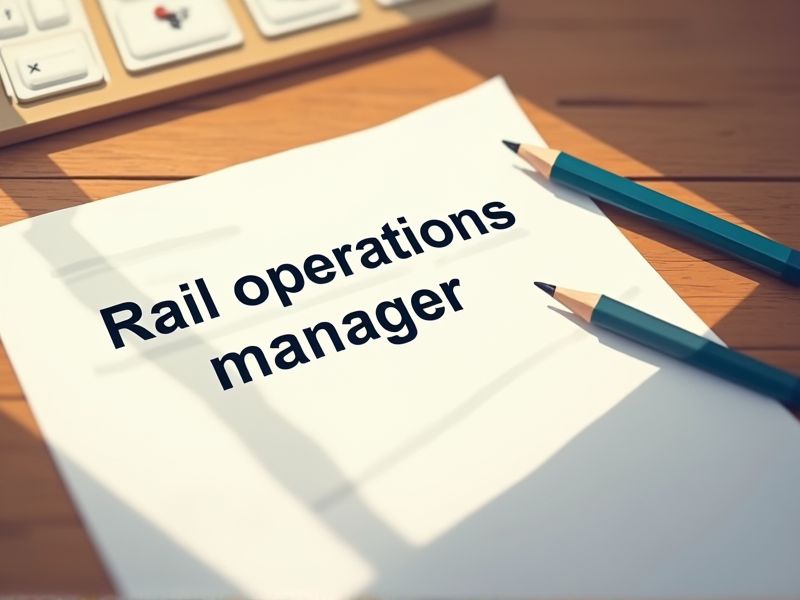
Rail operations managers oversee train schedules, safety protocols, and resource management. Without specific certifications, these managers may lack vital expertise in safety regulations, risk management, and operational efficiency. Certifications ensure they possess the skills necessary to maintain high safety standards and operational excellence. Key certifications for a Rail operations manager include:
FRA Rail Safety Certification
The FRA Rail Safety Certification ensures a Rail Operations Manager understands federal safety regulations, which reduces the risk of accidents. This certification validates the manager's competency in implementing safety protocols, fostering a safer work environment. Regulatory compliance is essential for avoiding legal repercussions and financial penalties in rail operations. The certification enhances credibility, instilling confidence among team members and stakeholders in safety management practices.
Transportation Worker Identification Credential (TWIC)
Rail operations managers often work within the secure areas of ports and intermodal facilities, which are classified as sensitive locations. The Transportation Worker Identification Credential (TWIC) serves as a security measure, verifying the identity and background of individuals working in these areas. This credential ensures that only vetted personnel can access secure sites, thereby mitigating risks associated with unauthorized entry. Possessing a TWIC can also facilitate smoother coordination with other transportation sectors, enhancing overall operational efficiency.
Certified Safety Professional (CSP)
Rail operations managers oversee complex systems where safety is paramount. Possessing a Certified Safety Professional (CSP) credential enhances their ability to identify, evaluate, and control safety hazards effectively. The CSP certification demonstrates a strong commitment to safety standards, aligning with the rigorous regulatory requirements of the rail industry. An operations manager equipped with a CSP has a greater capacity for reducing accidents and promoting a culture of safety.
Certified Manager of Quality/Organizational Excellence (CMQ/OE)
The Certified Manager of Quality/Organizational Excellence (CMQ/OE) credential enhances a Rail Operations Manager's ability to implement quality management principles and improve operational efficiency. It provides the necessary skills to identify and reduce inefficiencies, leading to smoother rail operations and improved safety standards. This certification equips managers with tools to foster a culture of continuous improvement, critical for adapting to the dynamic challenges in the rail industry. Having CMQ/OE can increase stakeholder confidence in the organization's commitment to excellence and quality management.
Project Management Professional (PMP)
Project Management Professional (PMP) certification provides rail operations managers with a structured framework for efficiently handling complex projects and meeting deadlines. It enhances their capability to manage risk, ensuring safety and reliability in rail operations. The certification also instills standardized communication skills, fostering better coordination among diverse teams and stakeholders. As rail projects grow in size and complexity, the PMP certification equips managers with the necessary skills to optimize resources and drive operational efficiency.
Lean Six Sigma Black Belt (LSSBB)
By applying Lean Six Sigma methodologies, a Rail Operations Manager can significantly reduce delays and operational inefficiencies, leading to smoother train schedules and improved service reliability. Root cause analysis within LSSBB helps managers identify systemic issues affecting safety protocols, thus enhancing safety compliance across the network. With process optimization, costs are reduced as waste is minimized and resource allocation becomes more effective, contributing to better financial performance. Enhanced data-driven decision-making fosters a proactive approach to problem-solving and continuous improvement in the rail operations sector.
Certified Transportation Professional (CTP)
Having a Certified Transportation Professional (CTP) ensures that a rail operations manager possesses comprehensive knowledge in transportation regulations and logistics management, essential for efficient operations. This certification aids in optimizing resource allocation by enhancing strategic planning skills. With CTP credentials, managers have proven competency in safety protocols, decreasing the risk of operational delays and incidents. Rail operations managers with CTP are often better equipped to navigate complex supply chain challenges, positively impacting overall service reliability and customer satisfaction.
Certificate in Transportation Risk and Crisis Management
The intricacies of rail operations involve numerous risk factors and potential crises which necessitate a specialized understanding of transportation risk management to ensure safety and efficiency. A Certificate in Transportation Risk and Crisis Management equips rail operations managers with the expertise to effectively mitigate these risks. Rail operations demand strong crisis response skills to handle unforeseen incidents and ensure minimal disruption, skills that are honed through targeted certification programs. Additionally, holding such a certification could enhance a manager's credibility and decision-making capability in high-stakes environments.
Railway Operations Management Certification
A Railway Operations Management Certification equips a rail operations manager with the necessary skills and knowledge to handle complex logistical tasks effectively. It provides a standardized understanding of safety regulations and operational procedures, ensuring consistency across the industry. Certification enhances credibility and demonstrates a commitment to maintaining high professional standards in a competitive job market. Moreover, it facilitates career advancement by validating expertise, often leading to increased responsibilities and opportunities for leadership roles.
Certificate in Transportation Security
Rail operations managers require a Certificate in Transportation Security because it enhances their ability to implement and oversee essential security protocols in transit environments. This certification ensures they possess up-to-date knowledge of federal regulations and industry best practices for safeguarding passengers and freight. Understanding security measures directly influences the efficiency and safety of rail operations. The certificate enhances managers' abilities to respond effectively to potential threats, thus minimizing risks and ensuring continuity in rail services.
Summary
When you, as a Rail Operations Manager, obtain certifications, your expertise in managing rail systems is enhanced. This accomplishment can lead to improved safety protocols and optimize operational efficiency within your team. Your qualifications can attract more job opportunities and potentially higher salary prospects. Recognition from certifications builds trust with stakeholders, leading to stronger professional relationships.
